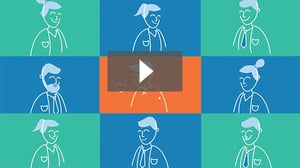In team-based care, teams of healthcare professionals work together to ensure their patients’ health needs are being met and the right care is being delivered in the right place, at the right time, by the right person. The entire care team is in close contact, often with the medical assistant serving a centered role.
This patient-centered approach is seeing success, and more and more care teams are adopting the model.

If you're just starting your healthcare career, or you're considering transitioning to a new position in a team-based care environment, you might be wondering how you can prepare. What can help you succeed in this setting?
We asked Leslie Day, a medical assistant who works in a team-based care environment, to share her insights and what she thinks healthcare students should know about team-based care before getting a job.
What do you think makes a strong team member in the team-based care model?
I think you have to have strong organization skills and strong communication skills.
I found without being organized it is very hard to keep up with all the work. I do all of my provider’s paperwork, his phone calls and rooming 20+ patients a day...so if you are not organized things can get missed and patient care will suffer.
Strong communication is key between you and your provider. I am not afraid to ask questions when I work with a new provider. I also feel when communicating with patients it is key to make sure you get all the information so you can accurately relay it back to the provider. I always tell new medical assistants to ask as many questions as you want — that is how you learn!
In adjusting to team-based care, what have been some of the challenges you've faced?
For me, the hardest thing was to get used to sitting next to my provider in the same office. I came from my own office space so it was very difficult at first. I was afraid I was going to be too loud talking on the phone to patients but it has never been a problem. The pace of work was much better ...actually I was able to know when my provider was available to talk with me about patients. Now I can't be without him.
Do you prefer team-based care?
Yes, I prefer team based care for a number of reasons. I feel when you work together directly with a provider you get to learn a lot from them. Also, things don’t get missed.
The biggest help I have noticed is that all the work is done the same day ... you are not coming into a pile of work from the day before — no more batching of work. So, if I have to be out on short notice, no one has to do my leftover work from the night before.
How do you think future healthcare professionals can prepare for the team-based care model?
What really helped Dr. Grimes and myself was seeing it first-hand. If I didn’t see it, I would have never believed it was possible. Seeing is believing!
Job shadowing is key - especially for a new medical assistant to be trained the right way. They can learn so much from just watching an MA and a provider in flow.
When considering potential candidates, what makes one stand out from another?
I think a potential candidate should have very strong communication skills, be able to work independently and be able to multitask.
How do new team members without any prior experience get acclimated to the team-based care environment?
We just hired an MA right out of school with no experience at all. I personally trained her — I had her just watch me then I slowly introduced her to things as she became more comfortable. It did take some time and patience but it was well worth it. Now she is thriving and working right next to her own provider! She is doing very well.


